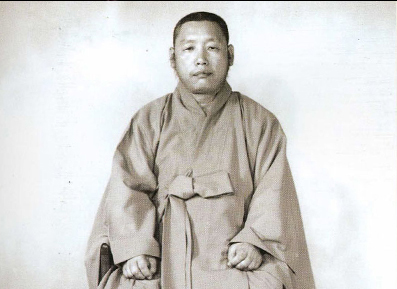Daegwangsa

- Supreme Patriarch Sangwol Wongak rebuilt Ttiantai Buddhism to
realize the salvation of all people through three indicators.
Supreme Patriarch Sangwol Wongak presented specific action plans of the three indicators and announced Order's Charter that the core is the popularization and habituation of Buddhism.
Supreme Patriarch Sangwol Wongak's Buddhist name (法名) is Sangwol
(上月) and his posthumous Buddhist name is Wongak (圓覺). He was born
as a descendant of Milseongdaegun in a Miryang Park Family in Bongchon
Village, Sangmaeup-ri, Nogok-myeon, Samcheok-gun, Gangwon-do on the 28th
day of the 11th month of the lunar calendar, 1911. The Supreme Patriarch
who was bright and serious and whose common name was Jundong (準東) since
he was a little child decided to be a Buddhist in spring with the introduction
of connection when he was 15 years old. After being the Buddhist, he witnessed
Avalokitesvara Guan Yin while he visited several domestic and overseas temples
and purified himself bravely and devoted himself. And he founded Guinsa Temple.
The Supreme Patriarch finally found great enlightenment on the 28th
day of the 12th month of the lunar calendar, 1951 while he practiced with several
students after founding Guinsa Temple. After accomplishing a great moral principle
(大道), the Supreme Patriarch left many achievements. They have been realized in a
number of different ways for a long time. In the end, it is concluded as part of
new Buddhism movements. The purposes of the new Buddhism movements are to reform
and save a lot of people and accord with the spirit of Bodhisattva of ‘the
Attaining Spritual Enlightment and Saving All Sentient Being(上求菩提 下化衆生)’.
As Tiantai Zhiyi in China clarified the truth of ekayāna (一乘) in the Tiantai
Buddhist sermon and Monk Eicheon, the State Preceptor Daegak, in the Goryeo Dynasty
smoothly united a lot of religious orders, Supreme Patriarch Sangwol Wongak also
tried to realize the salvation of all people through the three indicators.
So he rebuilt Tiantai Buddhism to inherit the noble and true spirit by reviving
long missions in history. Rebuilding Chontae Order of Korean Buddhism was the
serious affair that went down in Korean Buddhism history beyond religious orders.
Chontae Order of Korean Buddhism that inherited tradition of Korean Tiantai Buddhism
cut for a long time has sought a foothold in Tiantai thought, history, and asceticism
with experts of each field under the direction of the Supreme Patriarch.
After that, Supreme Patriarch Sangwol Wongak developed new Buddhist movements
of Patriotic Buddhism, Living Buddhism, and Popular Buddhism. Tiantai Buddhism's three
indicators present Buddhism and the spirit that the Supreme Patriarch sought concretely.
Supreme Patriarch Sangwol Wongak presented specific plans to be able to practice the three indicators, while he established the religious precepts that the living customs which inherit Korean tradition culture harmonize with modern life. So, he enacted the religious group's indicators and doctrines based on historicity and announced Order's Charter that the core is the popularization and habituation of Buddhism. Supreme Patriarch Sangwol Wongak who prospered Tiantai Buddhism in this land to reform people entered into Nirvana on the27th day of 4th months of the lunar calendar, 1974. The Supreme Patriarch will eternally be in our mind as a merciful and holy teacher.








